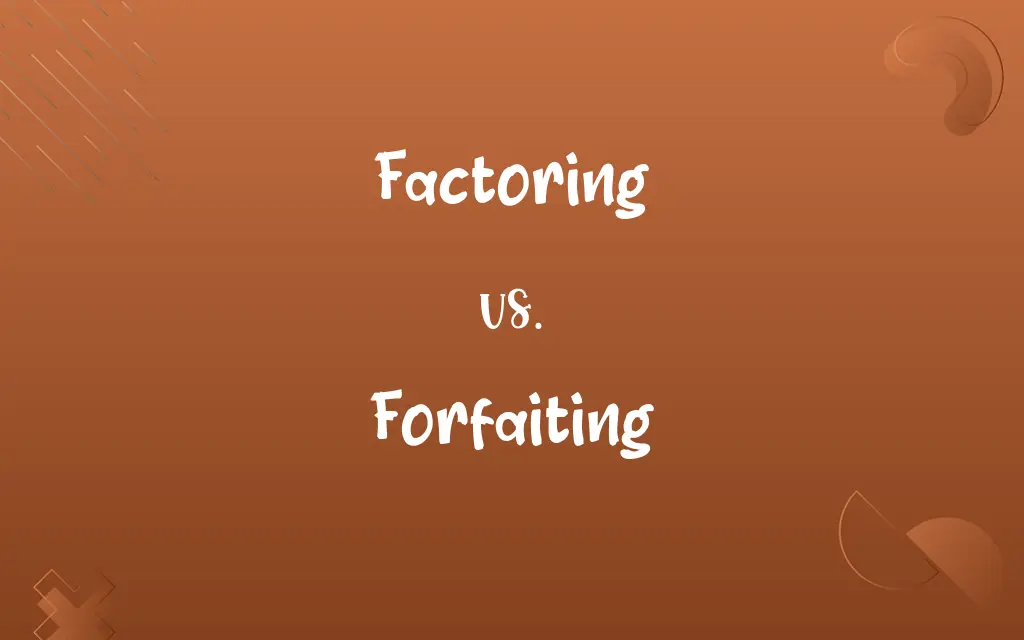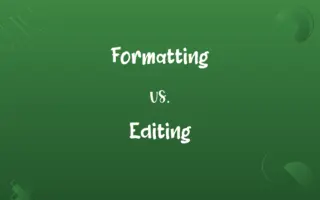Factoring vs. Forfaiting: Know the Difference

By Shumaila Saeed || Published on January 28, 2024
Factoring involves a business selling its invoices to a third party for immediate cash, while forfaiting is the selling of longer-term receivables for export transactions.

Key Differences
Factoring is the selling of a company's accounts receivables to a third party, typically for managing cash flow. Forfaiting, in contrast, involves the sale of larger, longer-term receivables related to international trade.
Shumaila Saeed
Jan 28, 2024
Factoring generally deals with short-term receivables, often from domestic transactions. Forfaiting specifically handles medium to long-term receivables, usually associated with international trade financing.
Shumaila Saeed
Jan 28, 2024
In factoring, the factor may assume credit risk for the receivables; however, in non-recourse factoring, the credit risk remains with the business. Forfaiting, on the other hand, typically involves the forfaiter taking on all the risks associated with the receivables.
Shumaila Saeed
Jan 28, 2024
Factoring transactions are usually smaller in size and shorter in term, often involving ongoing invoicing. Forfaiting deals with larger, single or few transactions with longer credit terms, often used in export financing.
Shumaila Saeed
Jan 28, 2024
Factoring can include additional services like managing sales ledgers and collection of receivables. Forfaiting is more focused on providing immediate liquidity and eliminating risks associated with international trade.
Shumaila Saeed
Jan 28, 2024
ADVERTISEMENT
Comparison Chart
Nature of Receivables
Short-term, often domestic
Medium to long-term, usually international
Shumaila Saeed
Jan 28, 2024
Risk Assumption
Variable, depends on recourse terms
Typically assumed by the forfaiter
Shumaila Saeed
Jan 28, 2024
Focus
Cash flow management, ledger services
Immediate liquidity, risk elimination
Shumaila Saeed
Jan 28, 2024
ADVERTISEMENT
Factoring and Forfaiting Definitions
Factoring
Factoring provides immediate cash by selling short-term receivables.
The company used factoring to quickly access funds tied up in customer invoices.
Shumaila Saeed
Jan 06, 2024
Forfaiting
Forfaiting typically involves the sale of medium to long-term receivables.
The manufacturer used forfaiting to sell its long-term receivables from a foreign buyer.
Shumaila Saeed
Jan 06, 2024
Factoring
Factoring involves the sale of receivables along with credit control.
By factoring its receivables, the business outsourced its credit collection process.
Shumaila Saeed
Jan 06, 2024
Forfaiting
Forfaiting involves selling receivables to transfer risk to the forfaiter.
Through forfaiting, the company transferred the credit risk of international trade to the forfaiter.
Shumaila Saeed
Jan 06, 2024
Factoring
Factoring can include risk assumption by the factor, depending on terms.
They chose non-recourse factoring to mitigate the risk of customer default.
Shumaila Saeed
Jan 06, 2024
ADVERTISEMENT
Forfaiting
Forfaiting is used for financing larger, longer-term export transactions.
They used forfaiting to finance an international shipment deal without bearing credit risk.
Shumaila Saeed
Jan 06, 2024
Factoring
Factoring offers a liquidity solution for businesses with cash flow challenges.
Factoring helped the company maintain liquidity during its peak season.
Shumaila Saeed
Jan 06, 2024
Forfaiting
Forfaiting provides immediate cash by discounting trade receivables.
Forfaiting allowed the exporter to receive immediate payment for its overseas sales.
Shumaila Saeed
Jan 06, 2024
Factoring
One that actively contributes to an accomplishment, result, or process
"Surprise is the greatest factor in war" (Tom Clancy).
Shumaila Saeed
Jan 05, 2024
Forfaiting
Forfaiting is a financing tool specifically for international trade.
Forfaiting was key in managing the company's risk in international transactions.
Shumaila Saeed
Jan 06, 2024
Factoring
(Mathematics) One of two or more quantities that divides a given quantity without a remainder. For example, 2 and 3 are factors of 6; a and b are factors of ab.
Shumaila Saeed
Jan 05, 2024
Factoring
A quantity by which a stated quantity is multiplied or divided, so as to indicate an increase or decrease in a measurement
The rate increased by a factor of ten.
Shumaila Saeed
Jan 05, 2024
Factoring
(Physiology) A substance that functions in a specific biochemical reaction or bodily process, such as blood coagulation.
Shumaila Saeed
Jan 05, 2024
Factoring
To determine or indicate explicitly the factors of
If you factor 70, you get 2, 5, and 7.
Shumaila Saeed
Jan 05, 2024
Factoring
A financial transaction whereby a business sells its accounts receivable to a third party (called a factor) at a discount.
Shumaila Saeed
Jan 05, 2024
Factoring
(mathematics) the resolution of an integer or polynomial into factors such that when multiplied together they give the integer or polynomial
Shumaila Saeed
Jan 05, 2024
Factoring
Factoring involves managing and financing accounts receivables.
Factoring their accounts receivable enabled the firm to focus on core operations.
Shumaila Saeed
Jan 06, 2024
Repeatedly Asked Queries
What is factoring in finance?
Factoring is selling a business's accounts receivable to a third party for immediate cash.
Shumaila Saeed
Jan 28, 2024
Is factoring suitable for small businesses?
Yes, it's often used by small businesses for immediate cash flow needs.
Shumaila Saeed
Jan 28, 2024
How does forfaiting work in international trade?
Forfaiting involves selling medium to long-term receivables from export transactions to a financier.
Shumaila Saeed
Jan 28, 2024
Is factoring the same as a loan?
No, factoring is not a loan. It involves the sale of receivables, whereas a loan involves borrowing money that must be repaid with interest.
Shumaila Saeed
Jan 28, 2024
How does factoring affect a business's balance sheet?
Factoring reduces accounts receivable on the balance sheet and increases cash assets.
Shumaila Saeed
Jan 28, 2024
What happens if the debtor does not pay the factor?
In non-recourse factoring, the factor assumes the credit risk, so if the debtor doesn't pay, the business is not responsible.
Shumaila Saeed
Jan 28, 2024
Are there different types of factoring?
Yes, there are recourse and non-recourse factoring, as well as domestic and international factoring, tailored to specific business needs.
Shumaila Saeed
Jan 28, 2024
Is factoring suitable for all industries?
Factoring is more common in industries with accounts receivable, such as manufacturing, distribution, and services.
Shumaila Saeed
Jan 28, 2024
What is the discount rate in forfaiting based on?
The discount rate in forfaiting depends on factors like the maturity date of the receivables, interest rates, and credit risk.
Shumaila Saeed
Jan 28, 2024
How does the factor determine the discount rate for factoring?
The discount rate is determined based on factors such as the creditworthiness of debtors and the volume of invoices being factored.
Shumaila Saeed
Jan 28, 2024
Can small businesses use factoring?
Yes, factoring is commonly used by small and medium-sized enterprises (SMEs) to manage cash flow.
Shumaila Saeed
Jan 28, 2024
Is forfaiting recourse or non-recourse?
Forfaiting is typically non-recourse, meaning the forfaiter assumes the credit risk if the debtor defaults.
Shumaila Saeed
Jan 28, 2024
What types of transactions is forfaiting commonly used for?
Forfaiting is commonly used for international trade transactions, such as the sale of capital goods, machinery, and equipment.
Shumaila Saeed
Jan 28, 2024
How does forfaiting benefit exporters?
Forfaiting provides exporters with immediate cash flow, eliminates credit risk, and helps secure financing for future projects.
Shumaila Saeed
Jan 28, 2024
Can small businesses utilize forfaiting?
Forfaiting is more commonly used by larger corporations engaged in international trade due to the size and nature of transactions involved.
Shumaila Saeed
Jan 28, 2024
Is forfaiting regulated by international standards?
Yes, forfaiting transactions are governed by international trade finance rules and industry standards.
Shumaila Saeed
Jan 28, 2024
Share this page
Link for your blog / website
HTML
Link to share via messenger
About Author
Written by
Shumaila SaeedShumaila Saeed, an expert content creator with 6 years of experience, specializes in distilling complex topics into easily digestible comparisons, shining a light on the nuances that both inform and educate readers with clarity and accuracy.





































































